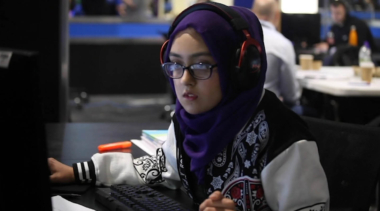London South East Colleges is a multi-campus further and higher education college and an eight-school multi-academy Trust. With campuses and schools across central and greater London (Bromley, Bexley, Greenwich, Lambeth and Surrey), its communities are culturally rich. The group works hard to maximise the positive impact it can have on people’s lives as an anchor institution deep-rooted in its communities.
The group is inspired by its communities of learners, staff and the recognition that every single person is unique. Group Chief People Officer Janet Curtis-Broni says:
To increase EDI it’s incumbent on organisations and us as individuals to continue to talk about it, raise awareness and embed it. To have those conversations which might not be comfortable. We really need to get to a point where everyone is comfortable with EDI and it’s embedded in everything we do.
“We strive to generate social value and promote social mobility in every part of our region ensuring people have the opportunities they need for fulfilling careers and good lives. We know that education creates a stable foundation for future generations, and it is crucial that everyone, regardless of background or ability, can access these opportunities. This includes a commitment to the Black FE leadership Group’s 10-point plan.”
Good progress is being made towards EDI objectives; the group received recognition as a Level 4 accredited employer in Investors in Ethnicity’s Maturity Matrix in 2022. Achieving this accreditation puts the group in the top 25 employers across sectors.
A Silver Employer award was attained from Stonewall, the world’s second-largest LGBT+ charity, for the group’s efforts in being an LGBT+ inclusive employer. Its positive approach to employing people with disabilities has been recognised by the Two Ticks scheme Award given by Jobcentre Plus to employers who have agreed to take action to meet five commitments regarding the employment, retention, training and career development of disabled employees
A key strand of the group’s EDI strategy is a pioneering 10-year grants programme launched as part of a response to the death of George Floyd in 2020. Student and staff engagement programmes identified a clear desire from staff and students to take positive action to address EDI issues across the organisation and the wider community.
To help make this happen the group set up a grants programme, making funding available over a long-term of up to10-years. Any member of staff or student can bid for money to undertake a project that will positively impact EDI within the organisation and local communities.
To date six projects have been funded with £78,000 being awarded and a commitment to the funding of further projects over a ten-year period:
Saved by the ball: A three-year project reaching out to disengaged Key Stage 4 and Key Stage 5 students using the power of sport. (£33,000). 30 students were involved in the initial stages. 100% reported that the impact of the coaching and mentoring has built their confidence, resilience and self-esteem and has helped to keep them in education. 14 of the students have been selected for the squad, playing regular fixtures against other schools, colleges and football academies. One student has also had the opportunity to work with Millwall Football Club and liaison continues with other professional football clubs to build up connections for other students who want to progress.
Positive Changes: A mentoring programme aimed at young black, Asian, dual-heritage and special educational needs and disabilities (SEND) students. (£10,000). 168 students from ethnic minority groups and SEND students have been involved in this initiative. They have participated in sports, cooking, gaming, music and other social activities to improve self-confidence and build additional life and employability skills to support their next steps.
Empower: A programme of curriculum-based activities focusing on empowering students of black, Asian and minority ethnic groups. (£25,000). 900 students engaged with the project delivered in a myriad of ways including presentations, workshops and tutorials. The four main strands were young designers, young entrepreneurs, employability and a film-making mini-project. This offered added value, supporting students to develop core employability and communications skills with 100% positive feedback.
LGBTQ+ History Month: A project to celebrate this initiative, (£8,500). This project has helped to create a safe space for people to talk about their experiences and so provided staff training and resources to support understanding and inclusion.
HE Student Social Mobility Project: Awarded to an HE student to create a space to engage a diverse community of students from different disciplines. (£500.00). The project has not only provided learning facilities for disadvantaged students but developed the research, social and communication skills of the student running the project. In a survey of users, 100% said they would use the common room more in the future. They appreciated the new facilities, which they believe will impact positively on their learning.
Multicultural days and events (Black History Month) – This grant was awarded to support multicultural days and events during the Black History month. (£1,000).
We are committed to EDI and focused on ensuring all action we take is tangible, demonstrating quantifiable impact that will bring about real change.
“Our wider strategy focuses on embedding EDI into every level and aspect of the organisation. We have a high level of disclosure among staff and students, enabling us to analyse our data, address any achievement gaps and ensure a diverse workforce and governing board.
“While we had a positive picture in terms of overall representation of staff in comparison to the demographic profile of our students, we saw evidence of under-representation of non-white staff at more senior levels. The intelligence has enabled us to take positive action including the creation of a talent management programme to identify future leaders as well as providing mentoring and coaching opportunities.
“For students, we have used this data to identify where achievement gaps lie and implemented targeted interventions, such as extra tutorials. To help narrow gaps further and support successful progression, ten student achievement tutors have been recruited to provide personalised support.
“We also plan to use grants to develop further research and insight into the reasons for the gaps, enabling us to take additional targeted action.”
To achieve long term impact, the group has committed to an EDI grants programme over a ten-year period, planning to fund around five projects a year providing up to £10,000 for each.
Every project will be fully evaluated to ensure they are achieving maximum impact and the group will continue to encourage grant applications from every part of the organisation.
Crucially, London South East Colleges are committed to sharing learnings from this work and these projects externally, contributing to wider discussions and evidence gathering to help make a positive difference beyond its own organisation.





